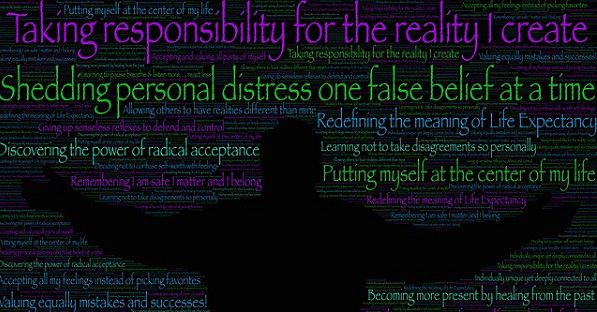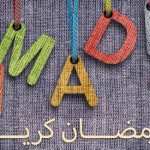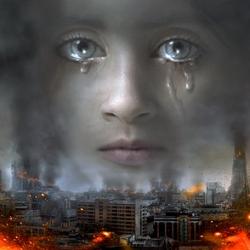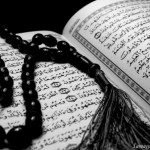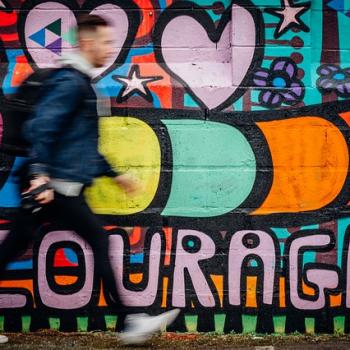This is Day 15 – halfway point – of the #30Days30Writers 2016 Ramadan series.
By Kameelah Mu’Min Rashad
As I scroll lazily through my newsfeed, I see the pre-requisite (somewhat amusing) annual “moon wars” are in full swing. Because of course it wouldn’t be Ramadan without incessant debate about whether or not to go with an international vs local hilal sighting.
But I also see colorful, cheerful e-cards, friends wishing loved ones a blessed start to the holy month, cool Etsy-like suggestions for Ramadan crafts for kids and how to make the fasting fun, interesting and creative for children on these long hot summer days. I began to thumb through these upbeat posts much faster, almost angrily.
A wave of sadness and self-loathing washed over me with tsunami-like force and intensity. It threatens to utterly crumble the walls of fake excitement I had managed to gather round me long enough to respond to others eager greetings of “Ramadan Mubarak Kameelah!”
I tasted the awful, bitter taste of resentment and jealousy begin to rise up like an incurable case of emotional acid reflux. Hot, salty tears threatened to spill from my eyes down my round cheeks; unwelcome, desperate and full of shame.
I wanted to close the blinds, lay in bed and mourn my complete lack of preparedness; to silently scream to the heavens how exhausted and spiritually bereft I felt in all the days leading up to this glorious month. I’m not ready, I whispered softly to myself, I’m just not ready.
It felt like I was being held hostage by a certain psychological inertia and emptiness brought on by a combination of postpartum depression, self-doubt, anxiety, sheer exhaustion, marital strain and emotional burn-out — all of which I had been experiencing for the past three months since the baby was born.
A few days later, I sent a text message to two dear sister-friends:
“Please make dua for me. I’m not in a Ramadan-y mood/spirit. At all. Mountains of school work and reading, end of the year school graduation and transitions for the kids, conflict with my husband … have all left me feeling numb and exhausted. I’m not interested in going to the masjid at all. I don’t feel like smiling when I don’t want to, or talking to anyone …”
I knew they wouldn’t judge me or try to soothe my misgivings with trite platitudes. (We all need friends like this!). One responded immediately and with a pragmatic naked truth and sincerity I’ve come to value and depend on tremendously:
“Allah got you. Sometimes it’s like that … Forget everybody else …This month is about what you need and how you communicate that to the Only One who can really help you anyway. Not how socially engaged you can be.”
The problem was that I had started down a dangerous road of comparing myself right NOW, to a Kameelah I had been one year ago — and found myself woefully inadequate. Last year, I felt grounded, purposeful, determined. I had prepared for 3 months to compete in an interfaith triathlon relay. I worked hard to train for the 10k by eliminating intake of dairy, sugar, bread and caffeine.
I lost a total of 35 lbs. I fasted that month and ran that race. (Unbeknownst to me I was pregnant with baby Izzy!) That change in diet and exercise had also contributed to a sense of peace and renewed energy that I absolutely relished. All this compared to the disconcerting sense of disconnection and fatigue I was currently battling to keep at bay.
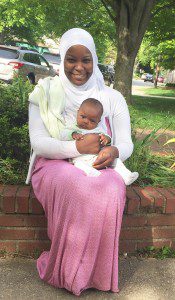
Ultimately, the overachieving, perfectionistic, highly self-critical tendencies that at one time or another served/serve me well in my academic pursuits were beginning to cannibalize even my relationship to faith and worship. How could I, feeling so uninspired and guilt ridden, possibly write this Ramadan reflection? Was that not hypocrisy?
In response to my Sister-friend’s encouragement, I stood in the middle of my kitchen, trying not to cry (yet again). I took a deep breath and replied: “Thank you. I needed that validation … sometimes we do need someone who will remind us of Allah’s mercy and his “come as you are, right now” unconditional love. Maybe this is just my acceptance year. Accepting new roles, transitions, disappointments.”
In this time of uncertainty and stress, I decided that I would allow myself to wholeheartedly embrace the idea of radical acceptance. Ironically enough, a concept I often teach to my clients, but I had not applied to this phase of my life. Radical acceptance is a complete and total acknowledgement of one’s current reality.
It is accepting what IS with every fiber of one’s being. It is not capitulation or giving up – simply embracing one’s circumstances and letting go of the urge to fight the truth of a moment in one’s life. This radical acceptance is liberating. And also extremely difficult.
I had to accept that this Ramadan I was feeling stuck and overwhelmed. I had to name the emotions permeating my reality in a non-judgmental way. Instead of berating myself for not being or performing on a (vague, undefined) higher spiritual plane, I needed to forgive myself for my shortcomings.
Forgive myself for creating and glorifying utterly unattainable expectations and ambitions — including those expectations of a spirituality that will never falter under the weight of my imperfections. To forgive myself for, in my despair, forgetting some of the glorious names of the Creator.
He is As Sabur – The Patient One, Al Ghafur – The Forgiver and Hider of Faults, Al Wadud – The Loving and Al- Wali – The Protecting Friend.
Walking down a path of self-forgiveness I’ve learned also requires seeking forgiveness from the Creator. He alone knows the pain and suffering in our hearts. He alone understands the vulnerability and frailty of His creation. So I had to forgive myself for being too ashamed to turn to him and share with Him my fears and insecurities.
This Ramadan for me means radical acceptance, embracing what IS, instead of haunting my heart and mind with thoughts of what OUGHT/SHOULD/MUST be. This Ramadan, I may not feel inspired or particularly motivated. But I AM striving to be more self-compassionate; to acknowledge my limitations instead of becoming a prisoner to them.
I am striving to see the beauty in the mundane, to appreciate God’s mercy and favor when my baby smiles at me with bright, shining eyes filled with love. May Allah guide me in the best way, may he open my soul to the subtle important lessons of the present, contained in each NOW moment.
May He allow me to glimpse the wisdom in my struggle. May He accept my flawed striving towards self forgiveness.
Kameelah Rashad is the founder and president of Muslim Wellness Foundation, a nonprofit organization dedicated to reducing stigma associated with mental illness, addiction and trauma. She is a mother, wife, doctoral student, chaplain, therapist, avid reader and cupcake and Talenti ice cream connoisseur. Find her on Twitter @KameelahRashad

